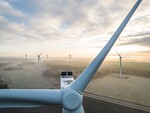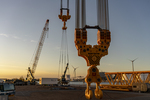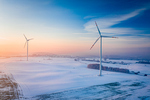03/19/2005
Example for growth set by German wind energy industry II
The recent report by the National Audit Office indicated that sourcing 10 percent of the UK's electricity from renewables would also increase power bills marginally, by about 5 percent by 2010, in the same order of magnitude as the numbers in the DENA study. "Given that gas prices are volatile and high, which has resulted in steep rises in power bills, this small rise in costs appears to be excellent value for money," BWEA said.
Wind will provide the vast bulk of the new renewable power required to meet this target. For this small additional cost, the UK wind industry will deliver savings of between 10 and 17 million tonnes of carbon dioxide, a significant part of our country's carbon dioxide reduction plans, thousands of new jobs and of course improve our nation's energy security. "This report, like that produced recently in the UK by the National Audit Office, makes clear that a significant expansion of wind power can be delivered at only a small additional cost to both German and UK consumers," Marcus Rand, chief executive of BWEA said.
It is true that carbon emissions can be reduced from present levels through energy efficiency at a lower cost than using wind power. However, savings available from efficiency gains are a one-time benefit and do not eliminate the requirement for environmentally sustainable power supplies. There is a need, given the scale of emission reductions required, for new carbon-free power generation to be developed alongside a rapidly expanding energy efficiency programme. Any coherent climate policy will include both energy conservation and renewables - and both the UK's and Germany's policies do just that.
Wind will provide the vast bulk of the new renewable power required to meet this target. For this small additional cost, the UK wind industry will deliver savings of between 10 and 17 million tonnes of carbon dioxide, a significant part of our country's carbon dioxide reduction plans, thousands of new jobs and of course improve our nation's energy security. "This report, like that produced recently in the UK by the National Audit Office, makes clear that a significant expansion of wind power can be delivered at only a small additional cost to both German and UK consumers," Marcus Rand, chief executive of BWEA said.
It is true that carbon emissions can be reduced from present levels through energy efficiency at a lower cost than using wind power. However, savings available from efficiency gains are a one-time benefit and do not eliminate the requirement for environmentally sustainable power supplies. There is a need, given the scale of emission reductions required, for new carbon-free power generation to be developed alongside a rapidly expanding energy efficiency programme. Any coherent climate policy will include both energy conservation and renewables - and both the UK's and Germany's policies do just that.
- Source:
- Online editorial, www.windfair.net
- Author:
- Trevor Sievert, Online Editorial Journalist
- Email:
- press@windfair.net
- Keywords:
- Germany, EWEA, wind energy, wind power, wind farm, wind turbine, rotor blade, offshore, onshore, renewable energy


























